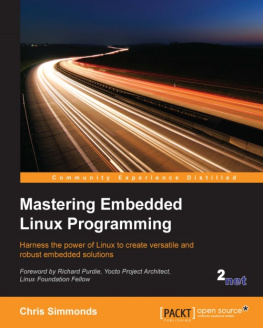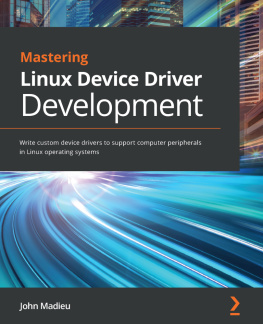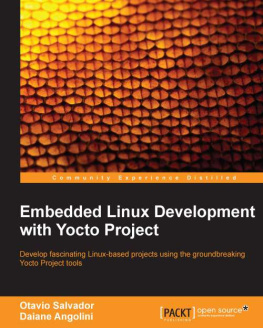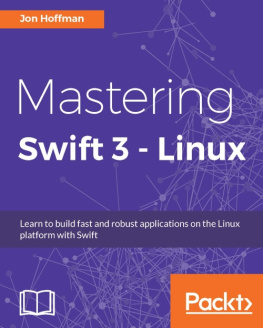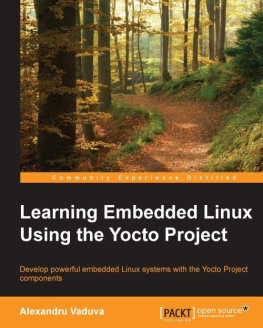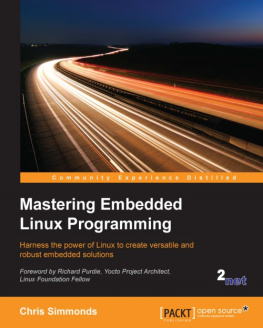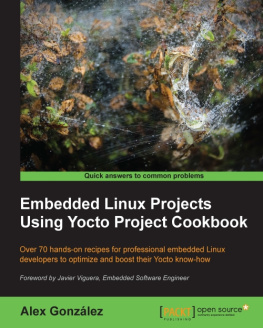Foreword
Linux is an extremely flexible and powerful operating system and I suspect we've yet to truly see it used to full advantage in the embedded world. One possible reason is that there are many different facets to it and the learning curves can be steep and time consuming.
Its possible to figure your way own through the world of Embedded Linux, as I myself have done over the past decade, however I am pleased to see people like Chris putting together books like this which give people a good grounding on many useful topics. I certainly could have used a guide like this back when I started!
I obviously have a personal bias to the Yocto Project, it being my major contribution and attempt to make a difference to the Embedded Linux world. One of its core objectives is to try and make things easier for people building Embedded Linux systems. We've had some successes; there are also areas we know work is still needed. We're continually trying to simplify barriers to entry and let more people get involved, make the technology more accessible and encourage adoption.
In writing this book, Chris is supporting the same objectives. I hope you enjoy the book, enjoy Linux and that ultimately that we might see you becoming a part of the vibrant open source communities that make up many of the components you're about to learn about.
Richard Purdie
Yocto Project Architect, Linux Foundation Fellow
About the Author
Chris Simmonds is a software consultant and trainer who lives in southern England. He has been using Linux in embedded systems since the late 1990s, during which he has worked on many interesting projects, including a stereoscopic camera, intelligent weighing scales, various set-top boxes and home routers, and even a large walking robot.
He is a frequent presenter at open source and embedded conferences, including the Embedded Linux Conference, Embedded World, and the Android Builders' Summit. He has been conducting training courses and workshops in embedded Linux since 2002 and in embedded Android since 2010. He has delivered hundreds of sessions to many well-known companies. You can see some of his work on the "Inner Penguin" blog at www.2net.co.uk.
I would like to thank my editor, Samantha Gonsalves, for her tireless work in reviewing my work and keeping me on track. I would also like to thank the people who took time to review my early drafts and to see through my obfuscations to the core of what I was trying to say. So, I would like to thank Behan Webster, Klaas van Gend, Tim Bird, Robert Berger, Mathieu Deschamps, and Mark Furman. Last but not least, I would like to thank my wife, Shirley Simmonds, for her support and for understanding the fact that I really could not help her redecorate the house because I had a book to write.
About the Reviewers
Robert Berger has been gathering practical and managerial experience in software design and development for embedded systems with and without hard real-time requirements since 1993. Since the beginning of the 21st century, he has been using GNU/Linux on desktops and server class machines, but mainly for embedded practices (automotive, industrial control, robotics, telecoms, consumer electronics, and so on). He regularly attends international events, such as Embedded World, Embedded Software Engineering Congress, Embedded Systems Conference, and Embedded Linux Conference as an expert and lecturer. His specializes mainly in training, but also in consulting (in German or English) worldwide. Robert's expertise ranges from the smallest real-time systems (FreeRTOS) to setups with multiple processors/cores and embedded GNU/Linux (user-, kernel-space, device drivers, hardware interfacing, debugging, multi-core, and the Yocto project) with a focus on free and open source software. He is a globetrotter. He is the CEO and embedded software specialist at Reliable Embedded Systems, which is based in St. Barbara, Austria. When he is not traveling, he lives with his family in Athens, Greece. Feel free to contact him on his website at http://www.ReliableEmbeddedSystems.com.
He has reviewed the book Embedded Linux Systems with the Yocto Project ( Prentice Hall Open Source Software Development Series ) by Rudolf J. Streif .
Tim Bird works as a senior software engineer for Sony Mobile Communications, where he helps Sony improve the Linux kernel for use in Sony's products. He is also the chair of the Architecture Group of the CE Working Group of the Linux Foundation. He has been working with Linux for over 20 years. He helped found two different embedded Linux trade associations and is the creator of the Embedded Linux Conference, which he still leads. Earlier in his embedded Linux career, Tim coauthored the book Using Caldera OpenLinux .
Mathieu Deschamps is the founder of ScourGE (www.scourge.fr), which provides open source software/hardware innovation services to its clients. They are leaders in the fields of telecommunication, mobile communication, industrial processes, and decision support systems.
He is an R&D business consultant and a trainer. Also, since 2003, he has been an independent tech-driver, involved in many large and small scale projects around GNU/Linux, Android, embedded systems engineering, and security.
Mark Furman , author of OpenVZ Essentials, currently works as a systems engineer for Info-Link Technologies. He has been in the IT field for over 10 years and specializes in Linux and other open source technologies. In his spare time, he enjoys writing and reviewing books on Linux and other open source technologies as well as tinkering with Arduino, Python, and Raspberry Pi projects at Knox Labs, a Hackerspace located in Knox County, OH.

